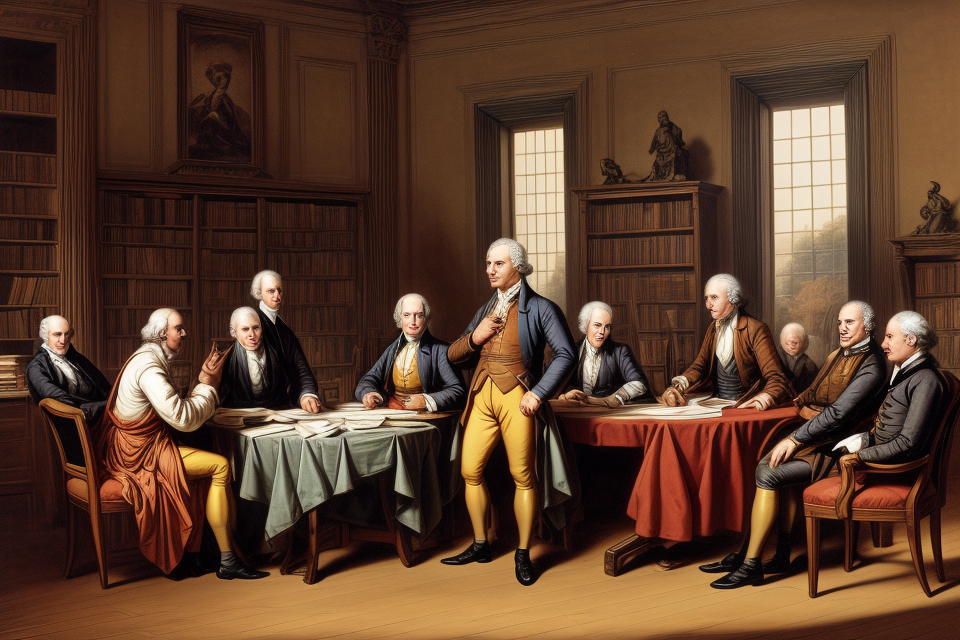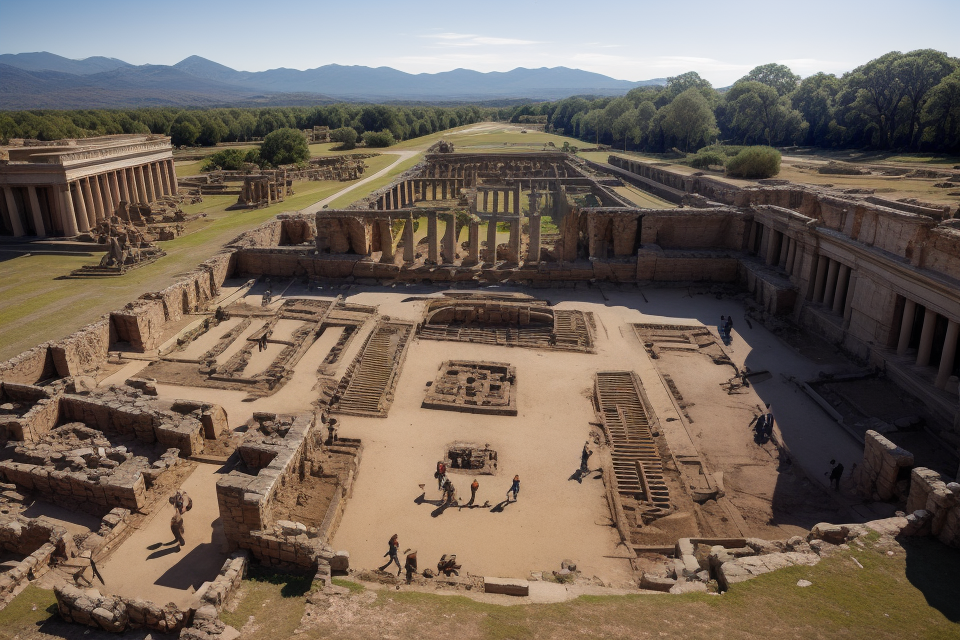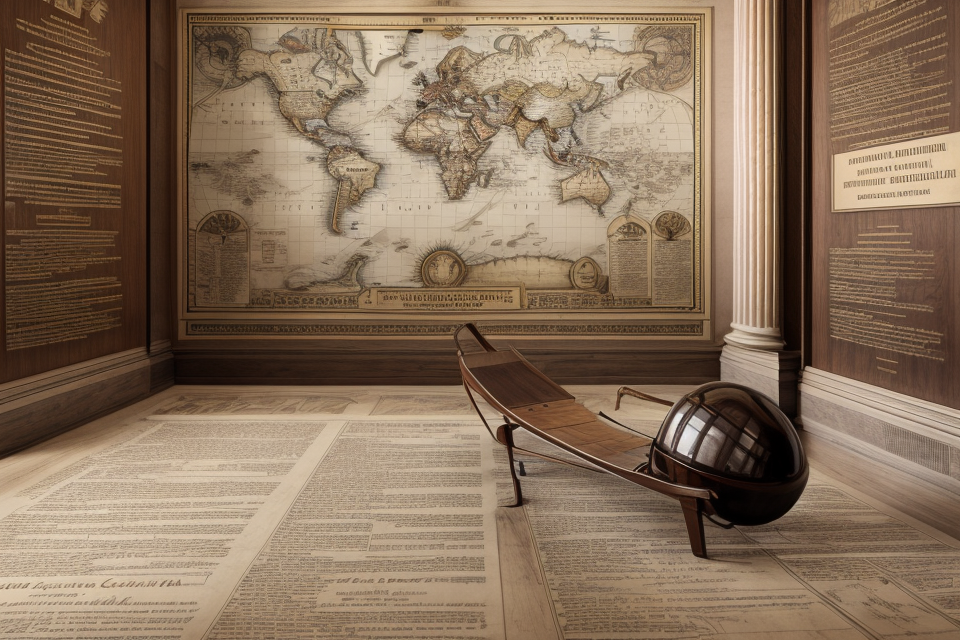In the age of Enlightenment, a revolutionary idea was taking shape – the concept of the general will. It was a radical departure from the traditional notion of individualism and heralded a new era of collective action. The general will, as envisioned by the great thinkers of the time, was a collective expression of the people’s desire for progress and happiness. It was seen as a powerful force that could overcome the limitations of individualism and pave the way for a brighter future. In this article, we will delve into the concept of the general will in the Enlightenment and explore its implications for society. So, let us embark on this fascinating journey and discover the power of collective action.
The Enlightenment and the Concept of the General Will
The Historical and Intellectual Context of the Enlightenment
The emergence of modernity and the rise of the modern state
During the Enlightenment, the emergence of modernity brought about significant changes in the way people thought about the world and their place in it. The rise of the modern state, characterized by centralized power and bureaucracy, created a need for new ideas about governance and the role of the individual in society.
The rejection of traditional authority and the search for a new moral and political order
The Enlightenment marked a turning point in the history of Western thought, as thinkers began to question traditional authority and seek a new moral and political order. This movement was characterized by a rejection of religious dogma and a commitment to reason and science as the basis for understanding the world.
As part of this intellectual revolution, the concept of the general will emerged as a way to articulate the relationship between the individual and society. This idea was central to the Enlightenment’s vision of a more just and equitable society, and it continues to be an important concept in political philosophy today.
The General Will: An Overview
The general will as a collective will
During the Enlightenment, the concept of the general will was used to describe the collective will of the people. This idea held that the people, as a whole, had a single will or desire that could be expressed through their government. The general will was seen as a way to ensure that the government represented the interests of the people, rather than just a select few.
The general will as a moral and political concept
The general will was also seen as a moral and political concept. It was believed that the general will represented the highest moral principles and that it was the duty of the government to act in accordance with these principles. The general will was seen as a way to create a more just and equitable society, where the common good was the guiding principle.
This idea of the general will was central to the political philosophy of the Enlightenment, and it was seen as a way to promote democracy and the rights of the individual. The general will was seen as a way to ensure that the government was accountable to the people, and that it acted in their best interests.
The Philosophers and the General Will
Jean-Jacques Rousseau and the general will
The general will in the Social Contract
Jean-Jacques Rousseau, a prominent philosopher of the Enlightenment, had a significant impact on the concept of the general will. His ideas were primarily expressed in his magnum opus, “The Social Contract,” which he published in 1762. In this work, Rousseau explored the relationship between the individual and society, emphasizing the importance of the general will as a guiding principle for a just and equitable social order.
Rousseau’s general will is the collective will of the people, reflecting the common good and the general interest of the community. According to Rousseau, the general will is not merely the sum of individual wills but rather an expression of the moral and political bonds that unite citizens within a state. He believed that the general will is a product of the “general sentiment” or “general interest” of the people, which is in opposition to the private interests of individuals or particular groups.
The relationship between the general will and popular sovereignty
Rousseau’s concept of the general will is closely tied to his notion of popular sovereignty, which holds that the people, as the ultimate source of political authority, have the right to choose their rulers and to determine the course of government. In “The Social Contract,” Rousseau argues that the general will is the foundation of popular sovereignty, as it represents the collective will of the people and serves as the basis for legitimate political authority.
According to Rousseau, the general will and popular sovereignty are mutually reinforcing concepts. When the people act in accordance with the general will, they exercise their sovereign power and fulfill their obligations as citizens. In this sense, the general will is both an expression of popular sovereignty and a means of realizing it.
In summary, Jean-Jacques Rousseau’s concept of the general will is an essential aspect of his political philosophy, emphasizing the importance of the collective will of the people as a guiding principle for a just and equitable social order. By linking the general will to popular sovereignty, Rousseau underscores the responsibility of citizens to act in the common interest and to exercise their sovereign power in accordance with the general will.
Immanuel Kant and the general will
The general will in the Critique of Pure Reason
Immanuel Kant, a prominent philosopher of the Enlightenment, contributed significantly to the development of the concept of the general will. In his magnum opus, the Critique of Pure Reason, Kant discusses the general will as a foundational element of moral philosophy. He asserts that the general will is the moral principle that guides the actions of rational beings in pursuit of the common good.
Kant argues that the general will is not simply the sum of individual wills, but rather a unique expression of the rational nature of human beings. The general will represents the moral law that governs the actions of individuals within a society, and it is based on the principle of universalizability. This means that any action guided by the general will must be capable of being universally applied without creating contradictions or conflicts with other moral principles.
Kant also emphasizes the importance of the general will in the realm of politics. He believes that the general will is essential for the functioning of a just society, and that it is the duty of individuals to submit their particular wills to the general will in order to maintain social harmony and promote the common good.
The general will as a moral principle in the Groundwork of the Metaphysics of Morals
In his later work, the Groundwork of the Metaphysics of Morals, Kant further develops his concept of the general will as a moral principle. He argues that the general will is the foundation of all moral action, and that it is the ultimate end of human practical reason. According to Kant, the general will represents the moral law that governs the actions of rational beings, and it is the source of all moral obligation.
Kant also emphasizes the connection between the general will and the concept of duty. He argues that individuals have a duty to follow the general will, even when it conflicts with their particular desires or interests. He believes that the fulfillment of this duty is necessary for the realization of the common good and the achievement of moral perfection.
Overall, Kant’s concept of the general will represents a significant contribution to the Enlightenment discourse on morality and politics. His emphasis on the importance of the general will as a moral principle that guides the actions of rational beings has had a lasting impact on ethical and political theory.
The General Will in Practice
The general will and the French Revolution
The Declaration of the Rights of Man and Citizen
During the French Revolution, the concept of the general will played a significant role in shaping the country’s political landscape. The revolutionaries sought to establish a new form of government that would prioritize the collective good over the interests of an individual or group. In this context, the Declaration of the Rights of Man and Citizen was adopted, which enshrined the principle of the general will.
The Declaration was a fundamental document that affirmed the sovereignty of the people and their right to overthrow oppressive governments. It also recognized the fundamental rights of all citizens, including liberty, equality, and fraternity. These principles were intended to guide the establishment of a new government that would prioritize the interests of the general will over those of any particular individual or group.
The Reign of Terror and the demise of the general will
However, the implementation of the general will during the French Revolution was not without its challenges. The Reign of Terror, a period of extreme violence and political upheaval, marked the end of the initial phase of the revolution. During this time, the revolutionaries resorted to brutal measures to suppress opposition and maintain control.
The Reign of Terror was marked by widespread executions, including the beheading of King Louis XVI and Queen Marie Antoinette. The revolutionaries also turned against one another, leading to a period of infighting and political violence. The excesses of the Reign of Terror undermined the legitimacy of the revolution and its ideals, including the principle of the general will.
Ultimately, the failure of the French Revolution to fully realize the principles of the general will highlights the challenges associated with implementing this concept in practice. While the Declaration of the Rights of Man and Citizen represented a significant step towards realizing the principle of the general will, the Reign of Terror and other forms of political violence demonstrated the difficulties associated with maintaining a government that prioritizes the collective good over individual interests.
The general will and modern politics
The concept of the general will played a significant role in the development of modern politics during the Enlightenment period. It served as a foundation for many political thinkers, who sought to establish societies based on the principles of freedom, equality, and the common good. In this section, we will explore the continued relevance of the general will in contemporary political thought and the challenges of applying it in contemporary politics.
The continued relevance of the general will in contemporary political thought
The general will continues to be relevant in contemporary political thought because it provides a framework for understanding the relationship between the individual and society. The idea of the general will emphasizes the importance of the collective good and the responsibility of individuals to work towards it. This idea has been influential in the development of many political ideologies, including liberalism, socialism, and communism.
Furthermore, the concept of the general will has been used to justify various forms of collective action, such as democratic decision-making, social welfare programs, and environmental protection. It is also used to justify the legitimacy of the state and its role in ensuring the welfare of its citizens.
The challenges of applying the general will in contemporary politics
Despite its continued relevance, the application of the general will in contemporary politics is not without its challenges. One of the main challenges is the difficulty in determining the will of the general will. Different individuals and groups may have different understandings of what constitutes the common good, leading to conflicts and disagreements.
Additionally, the concept of the general will can be used to justify authoritarian forms of government, in which the state claims to act in the interest of the collective good. This has led to concerns about the potential for the suppression of individual rights and freedoms in the name of the general will.
Another challenge is the issue of representation. The general will is often associated with the idea of the “general interest,” which can be difficult to determine and may not always align with the interests of specific individuals or groups. This can lead to questions about how to ensure that the interests of all members of society are represented and how to balance the interests of different groups.
Overall, while the concept of the general will continues to be relevant in contemporary political thought, its application in contemporary politics is complex and requires careful consideration of the challenges and potential pitfalls associated with its use.
FAQs
1. What is the general will in the Enlightenment?
The general will in the Enlightenment refers to the collective will of the people, which is believed to be the foundation of a democratic society. It is the will of the majority, which should be used to guide the decisions and actions of the government. This concept was first introduced by French philosopher Jean-Jacques Rousseau in his book “The Social Contract.”
2. What is the relationship between the general will and individual freedom?
The general will and individual freedom are two concepts that are closely related in the Enlightenment. While the general will is about the collective will of the people, individual freedom is about the right of each individual to make their own choices and live their life as they see fit. In a democratic society, the general will should be used to protect and promote individual freedom, rather than to restrict it.
3. How is the general will different from the will of the state?
The general will is not the same as the will of the state, which is often represented by the ruling government or monarchy. The general will represents the collective will of the people, while the will of the state represents the interests of those in power. In a democratic society, the general will should be used to guide the decisions of the government, rather than the interests of those in power.
4. What role does the general will play in democracy?
The general will plays a crucial role in democracy, as it is the foundation of a democratic society. It is the will of the people, which should be used to guide the decisions and actions of the government. In a democratic society, the general will should be used to ensure that the government is acting in the best interests of the people, rather than in the interests of those in power.
5. Can the general will be used to justify tyranny?
No, the general will cannot be used to justify tyranny. While the general will represents the collective will of the people, it should be used to promote individual freedom and the common good, rather than to restrict it. In a democratic society, the general will should be used to ensure that the government is acting in the best interests of the people, rather than in the interests of those in power.


